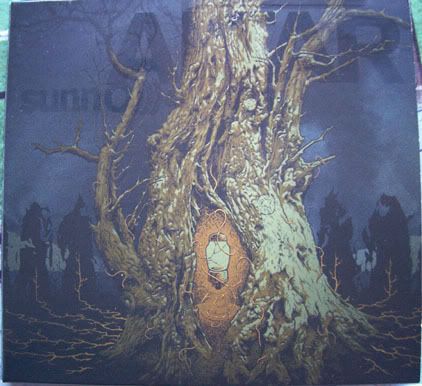
Saturday 30 December 2006

sunnO))) & Boris – Altar (2006):
Initial thoughts
I received, and listened to, this new album last night. Inspired by the music I heard, here is what I jotted down, in an obsessed frenzy:
The sound on the last track was immense. Too considered, and sophisticated, to merit the term ‘chaotic’, it was nevertheless a sonic mire of low frequency bass tendrils, high-pitched, yet strangely muted, guitar howl (as though the listener was going on a journey through a ghost-filled graveyard of Metal essence) – and all that lay betwixt.
This track, as with all on the disc, was impeccable, both in arrangement and mix; the sound was perfect in its brew of heaviness, sludge and sonic clarity. But, while impressive, what preceded this track beat it mightily.
The record opened with the sort of gradual build the prepared listener might expect from collaboration between the two bands (among the prime purveyors of musical terror in the USA and Japan), all guitar hints of menace, and ominous drum fills that recalled those of Justin Greaves in another sunnO))) collaboration, Teeth of Lions Rule the Divine.
While the disc was book-ended with traditionally neo-doom fare, these bookends pincered music at once more ‘regular’ in the grand scheme of things, and departure for the participants – especially the Americans.
Though it might be both stereotyping, and perhaps somewhat blinkered, to discuss music in terms of the masculine and feminine, I shall do so regardless, as I consider the two to be basic concepts (albeit a continuum, rather than binary; and even if they are merely signifiers, rather than actually linked with sex) in the aesthetic of music.
This can be evinced, on at least a superficial level, in the music of sunnO))). Their previous collaborations have seen them work with luminaries from Melvins, the Black Metal scene, as well as with Julian Cope.
And, while these musical ventures structurally usurped the traditionally ‘masculine’ rock linearity of gradually constructing a piece of music with the ultimate aim of conclusive release/ejaculation, with their bass-droning soundscape, there was a very definite masculinity in the meeting of hairy men to posture about Behemoths, and construct vulgar displays of power (amps).
So much so, in fact, that on previous sunnO))) albums, the very absence of any kind of traditional release felt like just that – an absence. The very form of the music was such that the listener expected the loudness and slo-mo riffola to lead somewhere. In the case of White 1 (2003), the resulting long-play wind-down that followed a half-hour introduction, in which Cope monologued about ‘sub-bass clinging to the valleys’, among other chest-beating proclamations, was bitter in its disappointment.
With this release, however, Boris brought something new to the table, beyond just the physical oestrogen of guitarist Wata. In their young, yet extensive, back catalogue, there are episodes of what erstwhile Terrorizer editor Nick Terry termed ‘Oceanic Metal’ (and half a decade before the release of that Isis album, in a Neurosis review) that, while building to finales, tends to undulate, and continue after the payoff (Flood, 2000; Feedbacker, 2003).
Augmented by guest vocalist Jesse Sykes, of The Sweet Hereafter, the meeting of Boris with that Metal near-equivalent of the Rorschach test that is O’Malley and Anderson, manifests in the form of the achingly beautiful ‘The Sinking Belle (Blue Sheep)’
With a gentle vocal performance that recalls Jarboe at her absolute breathiest, the song is an exercise in almost still serenity, hovering delicately in the air, as a photograph of a Butterfly in mid-beat, for nearly eight minutes. Then it fades, as though it could support itself no longer, into the sturdier ‘Akuma no Kuma’.
The latter is a strange track within the rock aesthetic, in as much as it is hard to discern whether its structure is that of evil Metal song that lacks a skeleton or, conversely, merely a skeleton itself, with no flesh on its bones.
The guitar sounds rise up the frequency ladder, out of the densely layered mix, with an almost liquid timbre. Perhaps more interestingly, the track is characterised by brief, though shocking, visits from an elephantine instrument (Oberheim? Korg MS20? I have no idea) that strides into the mix for a couple of brief interjections.
Its sound is essentially a (better produced) reminder of the fantastic movement of deluge in Neurosis’s ‘Æon’, a movement that is the most enormous sound in all the rock music that my CD player has experienced thus far.
Sandwiched between ‘Akuma no Kuma’ and the closing ‘Blood Swamp’ is the psychological springboard-to-elsewhere that is ‘Fried Eagle Mind’. Probably the most successfully textured track on the album, sounds traverse in the mix, while Wata gently intones the instruction to ’dream’.
Much of my favourite art, from concert and cinema to the odd album, acts as a conduit for me to make a psychic journey. This, while the mind technically wanders, is no negative, but rarely do I recall objective facets of that which I have just experienced. What I do remember, though, is that the experience was great. And so it is with Altar.
Subscribe to:
Posts (Atom)